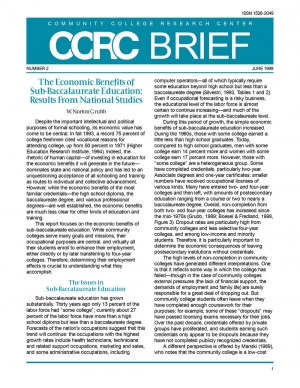
Despite the important intellectual and political purposes of formal schooling, its economic value has come to be central. In fall 1993, a record 75 percent of college freshmen cited vocational reasons for attending college, up from 50 percent in 1971.
Indeed, the rhetoric of human capital—of investing in education for the economic benefits it will generate in the future—dominates state and national policy and has led to an unquestioning acceptance of all schooling and training as routes to individual and collective advancement. However, while the economic benefits of the most familiar credentials—the high school diploma, the baccalaureate degree, and various professional degrees—are well established, the economic benefits are much less clear for other kinds of education and training.
This CCRC brief focuses on the economic benefits of sub-baccalaureate education. While community colleges serve many goals and missions, their occupational purposes are central, and virtually all their students enroll to enhance their employment, either directly or by later transferring to four-year colleges. Therefore, determining their employment effects is crucial to understanding what they accomplish.
